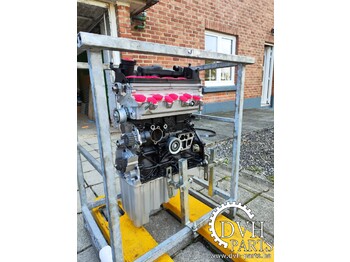Where to Discover one of the most Reliable Amarok Engine for Sale-- Top Providers and Choices
Where to Discover one of the most Reliable Amarok Engine for Sale-- Top Providers and Choices
Blog Article
Navigating the Refine of Engine Option: Key Elements to Think About
The procedure of engine option is a diverse undertaking that requires cautious evaluation of several essential factors to ensure positioning with operational objectives. Efficiency requirements, gas effectiveness, and financial restrictions are simply the start; factors to consider around environmental impact and maintenance support play a pivotal duty in the decision-making framework. Understanding exactly how each of these elements interacts can significantly influence the efficiency and long life of your financial investment. However, the complexities of each factor might not be quickly apparent, motivating more examination of just how to purposefully navigate this complicated landscape.
Performance Needs
When picking an engine, it is vital to establish clear efficiency demands that line up with the designated application. Performance needs encompass a variety of aspects, consisting of power output, torque characteristics, and responsiveness, which have to be customized to the details demands of the lorry or equipment concerned.
Power result, usually gauged in horsepower, figures out the engine's capability to push a vehicle or carry out a job efficiently. Torque, on the other hand, is crucial for applications calling for strong initial velocity or hefty training capabilities. An understanding of the functional atmosphere is likewise crucial; as an example, engines made for off-road applications may call for different efficiency features compared to those planned for freeway usage.
Furthermore, think about the functional lots and task cycle, as these variables influence the engine's longevity and reliability. In high-load scenarios, a durable engine style may be necessary to avoid premature wear or failing.
Fuel Performance Factors To Consider
While efficiency needs are critical, fuel efficiency is just as important in the engine selection process, as it straight impacts operating costs and environmental sustainability. Fuel-efficient engines consume much less gas per system of job done, which not only decreases total expenditure yet likewise reduces greenhouse gas exhausts. As companies progressively prioritize sustainability, selecting an engine that optimizes fuel performance can improve corporate obligation and compliance with ecological regulations.
When evaluating gas performance, it is important to take into consideration the engine's layout and innovation - amarok engine for sale. Developments such as turbocharging, direct gas injection, and hybrid systems can significantly boost fuel economic climate. In addition, recognizing the operating conditions and obligation cycles of the engine application is essential; engines might do in a different way under differing speeds and lots
Additionally, makers usually give gas consumption information that can be utilized to compare numerous engine options. It is a good idea to analyze these specifications in real-world scenarios to make certain precision. The kind of fuel made use of can likewise influence gas efficiency; alternate fuels might offer much better efficiency and reduced discharges. In recap, fuel efficiency is a multi-faceted factor to consider that calls for comprehensive analysis during the engine selection procedure.
Budget Plan and Expense Analysis
Spending plan and price analysis acts as a critical element in the engine selection process, affecting both short-term investments and long-term functional expenses. When evaluating potential engines, it is vital to consider not only the first purchase price yet additionally the total cost of possession, which incorporates setup, maintenance, fuel consumption, and potential downtime.
A thorough evaluation ought to start with the in advance costs related to the engine, including essential modifications or supplementary devices. Focusing solely on preliminary expenses might lead to misdirected choices. Reviewing operating expense over the engine's life expectancy is similarly vital, as a lot more expensive engines may provide premium gas performance or minimized maintenance needs, ultimately bring about cost financial savings.

Ecological Effect Factors
Understanding ecological influence variables is important in the engine selection procedure, as sustainability factors to consider have actually ended up being progressively crucial for both regulative compliance and corporate responsibility. Organizations must evaluate the exhausts generated by different engine kinds, consisting of co2, nitrogen oxides, particle matter, and unburned hydrocarbons. These emissions add dramatically to air pollution and climate change, demanding a cautious analysis of the engine's ecological footprint.
Furthermore, fuel kind plays a crucial duty in ecological influence. Engines powered by eco-friendly power sources, such as biofuels or hydrogen, tend to have a reduced environmental impact contrasted to conventional nonrenewable fuel sources. In addition, the lifecycle evaluation of the engine, from production via procedure to disposal, need to be taken into consideration to comprehend the complete range of its environmental implications.

Upkeep and Support Alternatives
When selecting an engine, the schedule of maintenance and assistance choices is an important consideration that can dramatically affect functional efficiency and long life. Comprehensive maintenance intends guarantee that the engine runs at peak performance and lessens unexpected downtimes. It is necessary to examine the manufacturer's assistance network, consisting of the availability of certified technicians and solution centers.
Examining the accessibility of spare components is also important. A reliable supply chain for parts can reduce lead times for fixings and upkeep, thus improving total efficiency. Furthermore, take into consideration the ease of obtaining technical paperwork and training sources, which are important for making sure that employees are well-equipped to deal with routine and emergency situations.
An additional vital factor is the warranty and service agreements provided by the producer. that site These agreements can offer satisfaction and monetary security against unpredicted issues. Eventually, a positive method to maintenance and support not only prolongs the life of the engine yet likewise contributes to the overall success of the operation. Cautious consideration of these aspects will certainly bring about informed decisions that align with operational objectives and spending plans.
Final Thought
Finally, the procedure of engine choice requires a detailed examination of different crucial factors, consisting of performance needs, gas effectiveness, budget restraints, ecological impact, and upkeep support. By diligently evaluating these his response elements, educated decisions can be made that straighten with operational purposes and sustainability goals. Ultimately, a strategic technique to engine selection will certainly guarantee optimum performance and durability while dealing with financial and environmental factors to consider efficiently.
While efficiency demands are critical, gas performance is similarly vital in the engine selection procedure, as it directly influences operating costs and environmental sustainability. As companies increasingly focus on sustainability, picking an engine that enhances gas efficiency can improve company duty and compliance with environmental policies.
Additionally, recognizing the operating problems and responsibility cycles of the engine application is crucial; engines may perform in different ways under varying lots and speeds. (amarok engine for sale)
Reviewing operating prices over the engine's browse this site life-span is similarly important, as more pricey engines might supply exceptional gas performance or lowered maintenance needs, ultimately leading to cost savings.
In conclusion, the procedure of engine selection demands a detailed evaluation of various critical elements, consisting of performance needs, gas effectiveness, budget plan restraints, environmental influence, and upkeep assistance. - amarok engine for sale
Report this page